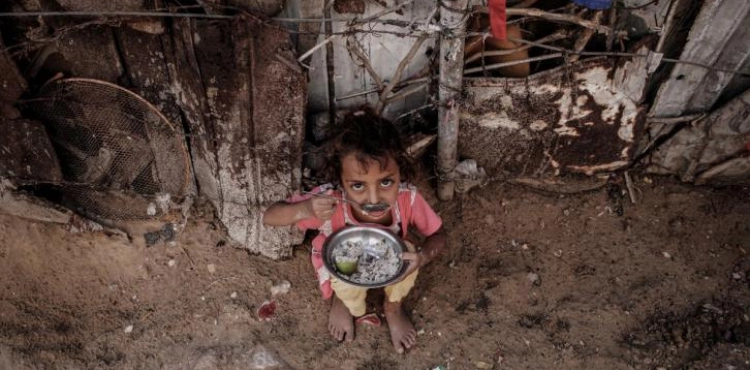Human rights expectations indicate that the percentage of families suffering from food insecurity in the Gaza Strip has approached at least 73%.
According to the Al-Mezan Center for Human Rights, the humanitarian situation is deteriorating significantly, unprecedented as a result of the Israeli blockade imposed on the sector 13 years ago, and restrictions on economic activities to prevent the spread of the Corona pandemic in the Gaza Strip.
The Center expressed its concern that thousands of people will continue to fall into poverty, calling for strengthening the flow of cash and food aid to reduce the worsening deterioration in the humanitarian situation.
The Center called on the international community to intervene quickly to end the siege of Gaza and to provide support and assistance to the Palestinians.
Monitoring and follow-up of living conditions in light of the current situation indicates that they have deteriorated in an unprecedented manner, both in terms of the numbers of the poor or the degree of severity of the poor, as a sharp decline in economic activities occurred, especially after the declaration of the state of emergency and the adoption of a set of measures by the government in the Palestinian territories, which included These measures shut down educational facilities, prohibit gatherings and gatherings, celebrations, and strikes throughout the Palestinian territories, cancel reservations for tourists, close religious and tourist areas, and suspend the organization of national and international conferences.
The repercussions of the 13-year-old Israeli blockade and restrictions on the movement of imports and exports that were associated with the Karuna pandemic were reflected on economic conditions, and a state of stagnation in the movement of markets and trade was damaged, and the activities of the tourism sector and the transportation sector were affected, and production facilities in many sectors stopped working, and weakened The ability of the private sector - the largest employer of the workforce - to retain workers.
In the absence of official statistics documented numbers of the unemployed in light of the Karuna pandemic, it is expected that unemployment rates will exceed more than half of the workforce, as the percentage recorded by the Central Bureau of Statistics reached (46%) in the first quarter of the year 2020 AD.
According to the Palestinian Ministry of Finance, the Israeli occupation authorities´ seizure of clearing money and the decline in economic conditions due to the downturn led to a sharp decline in public revenues that ranged between 60-70%.
May 2020 revenues were recorded at (237) million shekels, and were distributed between local revenues amounting to (137) million shekels, and external support amounted to about (100) million shekels, while the value of clearing funds was (zero), and by that The value of the financial deficit for the month of May becomes (863) million shekels.
In light of these developments, especially the blockade and restrictions, and their economic and social effects, whether the state of economic stagnation or widespread poverty; The consequence of the financial deficit is the delay in the disbursement of the delay in the payment of salaries of employees and retirees in the public office, and the stoppage of financial aid to the families of the martyrs and the wounded, a state of fear and anticipation prevailed, and the suffering of the population multiplied due to the continuing deterioration of economic conditions, and reflected on the food sector, where the challenges and constraints faced by the citizens pursued To obtain sufficient and quality food to meet the nutritional needs of individuals.
Because of the decline in economic indicators and the delay in the payment of salaries, sellers and merchants stopped selling on credit for a term, and they required cash to purchase consumables, which will raise the rate of food-insecure families to (73%) compared to (27%) of food-safe families.
It is noteworthy that, before the Corona pandemic, during the year 2018, 10.8% of households were classified as partially food safe and faced the risk of not being able to provide their need for food as a result of the limited financial resources, and the result of recent developments and in view of the size of recent economic changes and rebounds Corona pandemic This category has fallen and is facing a state of food insecurity as it suffers from a large consumption gap and cannot bridge this gap, which will add this percentage to the category that already suffers from a large gap and was (62.2%), among them (38.8) %) Is severely food insecure.
Al-Mizan Center warned of the continued deterioration of the humanitarian situation and its disastrous repercussions on society, especially food insecurity, stressing that strengthening international support and support and effective interventions to contain the effects of the pandemic remains crucial to protecting the residents of the Gaza Strip and returning the Gaza Strip to the acceptable path, as financial transfers are a lifeline In light of the prevalence of the phenomena of unemployment and poverty.
He called on the international community to put pressure on the occupation authorities to end the blockade imposed on the Gaza Strip, lift restrictions on the movement of individuals and goods, stop targeting economic sectors, especially the agricultural sector, and work to provide international assistance in the technical and material field to stop the collapse and improve various services in a manner that protects the human right to life In this region of the world.
He also called on the government and its various institutions to implement economic interventions, which contribute to solving worsening social problems, especially the problems of unemployment and flight.












